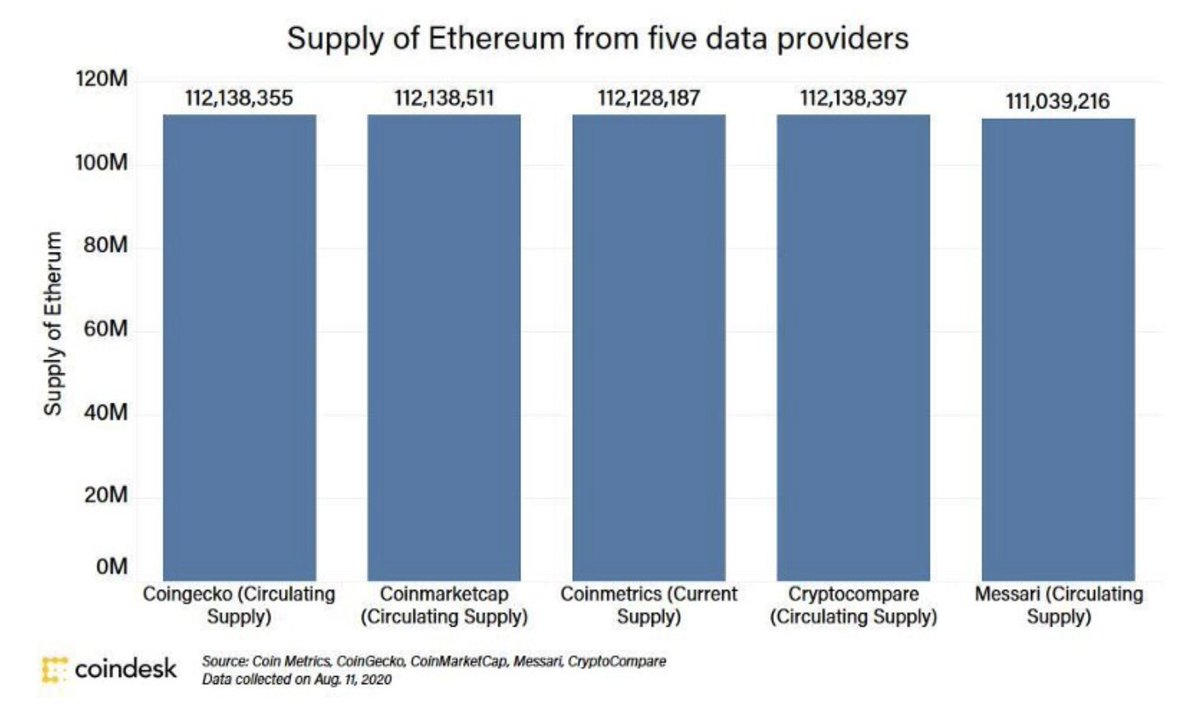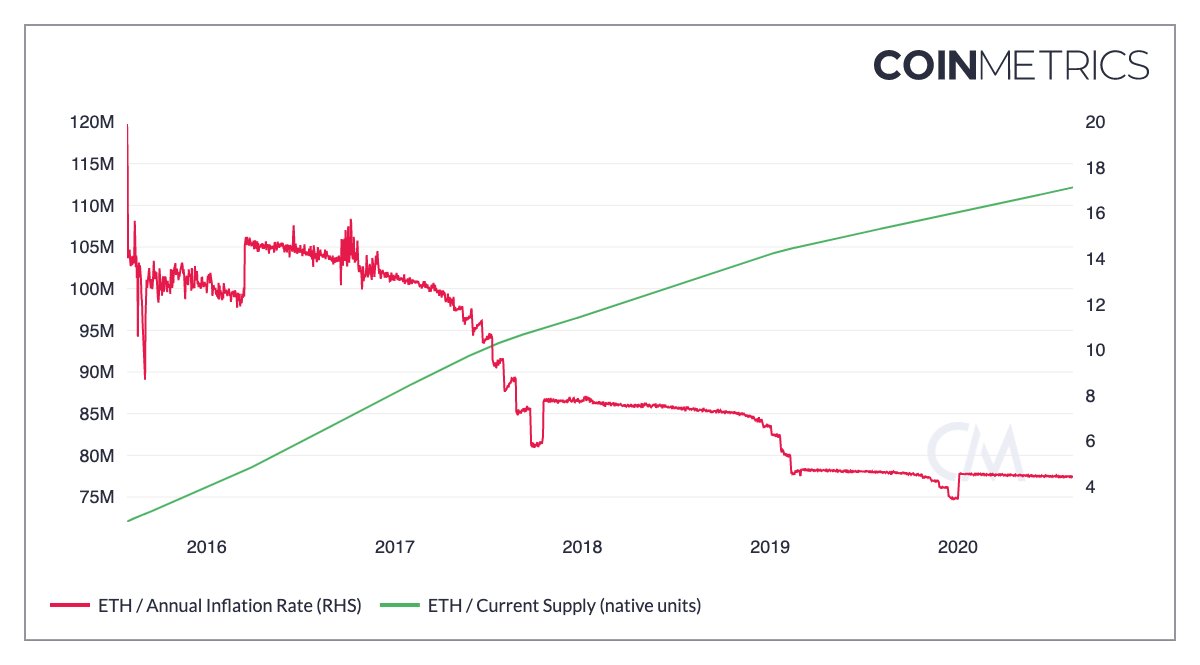Had to get something off my chest  https://abs.twimg.com/emoji/v2/... draggable="false" alt="👇" title="Rückhand Zeigefinger nach unten" aria-label="Emoji: Rückhand Zeigefinger nach unten">
https://abs.twimg.com/emoji/v2/... draggable="false" alt="👇" title="Rückhand Zeigefinger nach unten" aria-label="Emoji: Rückhand Zeigefinger nach unten">
I just published "Crypto& #39;s Weirdest Cognitive Dissonance", an examination of the issue around ETH& #39;s supply.
(and why we only seem to like decentralization & openness when it& #39;s convenient https://abs.twimg.com/emoji/v2/... draggable="false" alt="🙃" title="Auf den Kopf gestelltes Gesicht" aria-label="Emoji: Auf den Kopf gestelltes Gesicht">) https://link.medium.com/Xj9D8VlDW8 ">https://link.medium.com/Xj9D8VlDW...
https://abs.twimg.com/emoji/v2/... draggable="false" alt="🙃" title="Auf den Kopf gestelltes Gesicht" aria-label="Emoji: Auf den Kopf gestelltes Gesicht">) https://link.medium.com/Xj9D8VlDW8 ">https://link.medium.com/Xj9D8VlDW...
I just published "Crypto& #39;s Weirdest Cognitive Dissonance", an examination of the issue around ETH& #39;s supply.
(and why we only seem to like decentralization & openness when it& #39;s convenient
This week started with a seemingly simple question:
"What is the total supply of ETH?"
This question broke crypto twitter. As many found out, the answer turns out to be "it& #39;s complicated."
"What is the total supply of ETH?"
This question broke crypto twitter. As many found out, the answer turns out to be "it& #39;s complicated."
@CoinDeskData compiled the responses from 5 different data providers, and, as shown below, there is no consensus.
Respondents pointed at custom scripts, chain explorers and 3rd party querying tools; all of which highlighted an undeniable issue: there is no definitive answer.
Respondents pointed at custom scripts, chain explorers and 3rd party querying tools; all of which highlighted an undeniable issue: there is no definitive answer.
And instead of having an overdue discussion on *why* there isn& #39;t consensus on ETH& #39;s supply, I felt like the conversation got dismissed with a blank "it& #39;s hard to calculate it" or "use a 3rd party"
-A particularly weird response from people who so openly promote decentralization.
-A particularly weird response from people who so openly promote decentralization.
But make no mistake, this lack of consensus should be taken seriously, *especially if you care about ETH.*
Consider that Bitcoin Core is as old as this industry itself and it still experienced a couple of inflation bugs over its history, one (unexploited) as recent as 2019.
Consider that Bitcoin Core is as old as this industry itself and it still experienced a couple of inflation bugs over its history, one (unexploited) as recent as 2019.
If you& #39;re running a Ethereum node today, there& #39;s simply no standardized RPC routine to audit ETH& #39;s supply. Beyond transparency, this makes potentially catastrophic bugs harder to find.
As we approach a new bull marker, maybe it& #39;s time to have a real conversation about this?
As we approach a new bull marker, maybe it& #39;s time to have a real conversation about this?
I won& #39;t generalize: kudos to all Ethereans out there that resisted labeling this as "FUD" and that were genuinely listening and willing to have an open discussion.
It& #39;s nothing new, but if you& #39;re going to preach openness and decentralization, this has to be addressed.
It& #39;s nothing new, but if you& #39;re going to preach openness and decentralization, this has to be addressed.
At this point, any estimate of ETH& #39;s total supply is as good as the methodology employed.
@CoinMetrics has done a ton of work to remove any subjectivity from our total ETH supply methodology and metrics.
@CoinMetrics has done a ton of work to remove any subjectivity from our total ETH supply methodology and metrics.
Our total ETH supply figures very closely match Etherscan& #39;s, Ethereum& #39;s largest blockchain explorer.
This is good news given Etherscan& #39;s importance to the Ethereum ecosystem. However, CM& #39;s In-House-Blockchain-Indiana-Jones still found some discrepancies https://twitter.com/khannib/status/1293560605996191745?s=20">https://twitter.com/khannib/s...
This is good news given Etherscan& #39;s importance to the Ethereum ecosystem. However, CM& #39;s In-House-Blockchain-Indiana-Jones still found some discrepancies https://twitter.com/khannib/status/1293560605996191745?s=20">https://twitter.com/khannib/s...
We believe @etherscan made a tiny rounding error, but without looking into their methodology, it& #39;s hard to say.
It goes to show that, without a protocol-defined methodology to calculate supply, it is very unlikely that two parties will agree at the decimals level.
It goes to show that, without a protocol-defined methodology to calculate supply, it is very unlikely that two parties will agree at the decimals level.
And as much as I want you to trust CoinMetric& #39;s data (knowing the care that goes into calculating it), our estimates should be no replacement for the ability to verify it for yourself.
An equivalent to gettxoutsetinfo should be the very minimum benchmark for any crypto asset.
An equivalent to gettxoutsetinfo should be the very minimum benchmark for any crypto asset.
If you care about ETH, take this criticism seriously and call your local Geth maintainer.
Urge them to prioritize building an RPC subroutine that uses a single methodology to calculate ETH supply.
After all, the need for strong supply assurances is why this industry exists!
Urge them to prioritize building an RPC subroutine that uses a single methodology to calculate ETH supply.
After all, the need for strong supply assurances is why this industry exists!
Tagging client maintainers & relevant people @peter_szilagyi. @mhswende, @jacogr, @jeffehh, @tomusdrw, @aantonop, @pierre_rochard, @fxlange, @nic__carter, @lightcoin

 Read on Twitter
Read on Twitter



